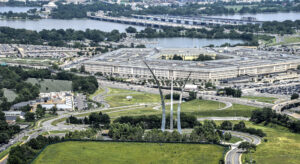That’s the question at the heart of an ongoing debate about the role of private space enterprise in national security.
Lower launch costs and advances in small satellites have fueled growth in space-as-a-service, a business model where customers can buy access to data or broadband from satellites without having to invest in spacecraft or launch vehicles.
In a November report, the Aerospace Corp. said it’s time for U.S. national security agencies to consider space services as alternatives to the traditional model of hiring contractors to develop bespoke capabilities.
Space-as-a-service is a booming sector of the industry, offering remote sensing imagery, radio-frequency signal collection, communications, navigation, space situational awareness and weather data, among other products.
The U.S. Space Force wants to tap into this new world but leaders are urging for patience.
It’s not easy to change a deeply entrenched system, said Col. Russell Teehan, Space Force portfolio architect at the Space and Missile Systems Center.
The current ecosystem is “geared towards an old model where 98 percent of the dollars are going to a small set of companies doing a very finite architecture,” Teehan said April 13 at an AFCEA industry event.
Today’s military space market is dominated by a handful of large prime contractors. Small businesses and startups compete for modest research and development contracts, and hope that the large primes invite them to join their teams when the big acquisition deals are awarded.
Teehan said the Space Force wants to shake things up. “We’re trying to offer opportunities so the small businesses can come directly into the ecosystem and into the market,” he said.
To help ease the way for commercial players, Teehan’s office is designing a “hybrid architecture” to guide future investments. Here, hybrid means a mix of government, large aerospace and NewSpace-developed systems. His office also is looking at how SMC might buy space services.
“We have to create that vision, we have to go after each mission area one at a time, we have to shift the dollars from the old to the new,” Teehan said.
One of the newest offerings from the industry is infrastructure-as-a-service, a solution that startup Loft Orbital hopes to sell to the U.S. military.
Under this model, the military would buy payload accommodations on Loft Orbital-owned satellites. “Instead of building a custom solution, what we do is buy a bunch of satellites and then sell seats on them,” said Loft Orbital’s co-founder Alex Greenberg.
But for the government to really benefit from this service, it has to be open to making adjustments, Greenberg said. A Loft Orbital satellite, for example, might not fill 100% of what the government wants but might provide 90% at a fraction of the cost of a traditional space mission and on a faster timeline.
“Not every customer is that way but I do see a segment of the U.S. government enterprise starting to think in that way,” Greenberg said.
National security agencies embracing commercial space include the Defense Advanced Research Projects Agency and the Space Development Agency.
DARPA last year bought a seat on a Loft Orbital satellite to fly a payload for the Blackjack low-Earth-orbit constellation the agency is preparing to deploy. “DARPA had a need and within five months we were under contract,” said Greenberg.
Moving forward, DoD and the Space Force can no longer ignore the impact of the emergence of new players. Due diligence is warranted before changing to unfamiliar business models. But as billions of private dollars flow into the space sector, the government will have to take some risks in order to capitalize on this investment. That could help diversify the defense industrial base and spur the desired innovation.
Sandra Erwin covers military space for SpaceNews. She is a veteran national security journalist and former editor of National Defense magazine.
“On National Security” appears in every issue of SpaceNews magazine. This column ran in the April 19, 2021 issue.




